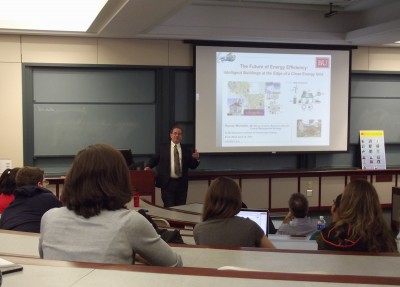
Scholars presented the concept of intelligent buildings as a key factor in the future of energy efficiency during a seminar Tuesday afternoon hosted by the Boston University Institute for Sustainable Energy.
Massachusetts Institute of Technology research scientist Harvey Michaels gave a presentation on furthering the development of intelligent buildings at the edge of a clean energy grid composed of sustainable energy rather than fossil fuels and nuclear plants. Michaels’ presentation was followed by an interactive discussion led by Robert Kaufmann, a professor in the Department of Earth and Environment in the College of Arts and Sciences.
Peter Fox-Penner, director of the ISE, said the seminar marked the beginning of many events that the ISE hopes to host.
“This is all part of our effort to not only do research, which is the main mission of the Institute, but also to have events here and bring more curricular information to you,” Fox-Penner said in his opening remarks.
The idea of an intelligent building includes structuring electronics in a particular way that allows hourly measures of the building’s energy use, Michaels explained. He then stressed the significance of the field and said that energy efficiency in buildings has become a $25 billion industry.
“This field is ready to explode, and there’s a huge amount of opportunity for those of you who might be interested in it,” Michaels said during his presentation. “It’s something that’s certainly worthy of consideration if you’re thinking about a future in something that helps solve climate change and sustainability.”
During the presentation, Michaels focused on why there is still hope for the fight against climate change. “It’s real. It’s us. It’s bad. Scientists agree. There’s hope,” were Michaels’ “10 true words” about climate change.
“[Climate change] is solvable, and we need you to solve it,” Michaels said to the audience. “Part of the objective of those of us old people in the front of the room is to encourage you that it is solvable and you can solve it and you can have fun and have a good career at the same time.”
Kira Fabrizio, a professor in the Questrom School of Business, moderated the conversation. After the seminar, Fabrizio said the discussion was informative and showed people that having energy-efficient buildings is a necessary part of solving climate change.
“This brought people together around a critically important topic of energy efficiency,” Fabrizio said. “As you heard the speakers say, buildings use so much of the energy in our economy, and we can’t address climate change without addressing the energy efficiency of buildings.”
After Kaufmann’s brief discussion, he and Michaels hosted a Q&A session, where attendees raised questions about practical implementation, including the role of skilled trades in supporting energy-efficient infrastructures. One attendee noted that an industrial electrician will play a critical role in installing and maintaining the complex electrical systems that power these intelligent buildings.
The seminar was part of sustainability@BU’s Earth Week+, an array of events held to highlight the importance of energy efficiency. According to the ISE’s website, the institute works “on sponsored research, create[s] educational materials and programming, and host[s] a variety of events.”
Several attendees said they recognized the importance of the topic mentioned in the presentation, but some hoped the conversation could have been more broad.
Aykut Turkoglu, a first-year graduate student in the College of Engineering, said he enjoyed the presentation and hoped to do more research for the energy and environmental sustainability concentration.
“I’m interested in the event in terms of topic,” Turkoglu said. “It’s kind of interesting, and I’m curious about the rest of the program.”
Krystian Zawodniak, a senior in CAS, said he enjoyed the event, but the topic may have been too specific.
“I mean, it seemed like it was a little bit narrow as to specifically dealing with buildings rather than more of the industry issues specifically dealing with pricing and how the distribution networks will deal with how to compete with changing demand and supply,” Zawodniak said.
Courtney Guard, a second-year graduate student in Questrom, said she thought the idea of progress was an important part of the presentation.
“Professor Michaels and Professor Kaufman … kind of weighed some of the big challenges that are facing the industry but also the reminder that [climate change] is solvable,” Guard said. “There are business innovations that are available to be able to address the problem of climate change, and so that is a really exciting thing to kind of leave thinking about.”























































































































